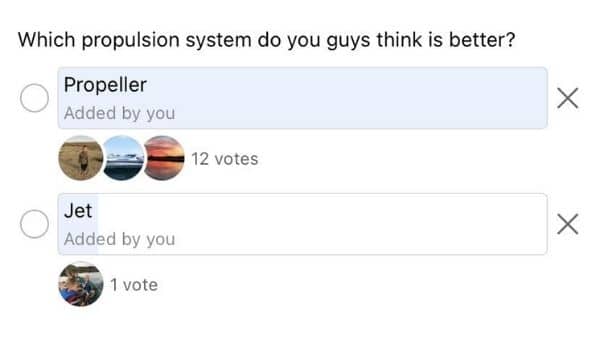There are really only two main types of propulsion used for boats, and that is either with a propeller or water jet. Both of which have their pros and cons, but propeller boats are by far more common. This is primarily because of efficiency and availability.
So, is a jet or propeller boat better? For most people, propeller propulsion boats will be the better option when compared to jet propulsion. Jet boats are more meant for a specific kind of person, such as one that does a lot of boating in shallow water. Propeller boats have many pros that, for most people, outway the cons.
Although it’s sad how few people participated in my Facebook poll, it clearly shows which propulsion system most people like:

Efficiency, price, durability, and many different factors should go into deciding on which propulsion system is better for you. Below I explain everything that you need to know before making that decision.
What makes jet propulsion boats special?
Although I do prefer propeller boats, for many people jet boats might be better. here are some of my favorite things about jet boats that propelled boats don’t have.
- New jet boats tend to cost a little less than similar propeller boats (more on this later in the article).
- Jet boats usually go faster than propeller boats (also more on this later).
- There’s no prop, so it’s way less likely to hit any shallow outcroppings, which would cost hundreds to fix on a propeller propulsion boat.
- Also, having no prop means that you can beach your boat in extremely shallow water without having to worry about it getting stuck in the sand.
- Jet drives have much less maintenance because they don’t have a big prop with many different parts that could break or need fixing.
- There is no propeller or large prop on a jet boat, so you don’t have to worry about anyone getting hurt by anything under the boat.
- Jet drives have a much faster acceleration time because there is no gear casing.
- Very good maneuverability in calm water.
- You don’t ever have to adjust the trim because jet propulsion already gives a very low bow rise as you accelerate.
- Winterizing is extremely easy and pretty much anyone can do it themselves.
Why do most people choose propeller propulsion boats?
To start, the vast majority of motorboats are propeller-powered. There are only a handful of brands that do jet boats, primarily Yamaha and Sea-Doo. Below I explain the points on why propeller boats are so much more popular than jet boats.
- Propeller propulsion has much better fuel efficiency than jet boats (more on how much better later in the article).
- Most propeller boats perform much better in rough water because they stay lower and cut through the waves.
- Propeller boats make a much cleaner wake than jet boats. This makes watersports such as skiing and wakeboarding easier to do.
- Propeller motors are used on pretty much every large boat.
- Along with the cleaner wake, propeller boats usually have a better time staying straight while a wakeboarder or skier is swinging side to side while being towed. Jet boats sometimes get pulled in different directions by the person being towed, forcing constant corrections by the driver.
- Although not having trim can be a good thing, sometimes for certain weather conditions the ability to change the trim on propeller boats really helps.
- Propeller boats actually have a neutral gear making docking in windy weather much easier.
- In weedy areas or areas with a lot of debris, propeller boats usually do better as you don’t have to worry about stuff getting sucked into the impeller.
- Most propeller boats are quieter than jet boats when cruising at high speeds
How much more fuel efficient are propeller propulsion boats than jet boats?
In a study from boatingmag.com (source), they tested two boats. One was a Sea-Doo 210 Challenger S jet boat with a 255 horsepower engine, and the other was a 19-foot sport boat with a 220 horsepower Mercury sterndrive. Here are the results:
| Fuel Usage | Jet Boat | Propeller Boat |
|---|---|---|
| At cruising speed | 8.2 gph | 4.7 gph |
| At high speeds | 19.6 gph | 11.1 gph |
So although jet boats do have a quicker acceleration time and go a little faster, Your wallet is gonna feel it when it’s time to fuel up.
Does jet or propeller propulsion cost more?
When it comes to the used market, there are much more propeller boats available making it much easier to find a good deal on propeller boats. That’s not saying it’s impossible to find good deals on jet boats though because they are still out there.
But let’s talk about new boats. After comparing many different jet boats and propeller boats, I have concluded that jet boats tend to cost around $10,000 to $30,000 less than similar propeller propelled boats. Here is my proof:
First off I compared the prices of brand-new center console boats that were very similar to each other (similarities included horsepower, length, design, etc.) except for the fact that some were jet-propelled and others propeller. Some of which were even made from the same brand (Scarab and Wellcraft are the same brands).
| Center Console Boat | Starting Cost (MSRP) |
|---|---|
| Scarab 255 Open ID (Jet) | $71,733 |
| Wellcaft 262 (Propeller) | $115,000 |
| Yamaha 255 FSH Sport E (Jet) | $81,999 |
| Scout 235 XSF (Propeller) | $116,443 |
As you can see at least for center console boats, the trend seems to be that jet propulsion is cheaper. Is this the same though when we compare other boats such as wakeboarding/wake surfing boats?
| Wakeboarding Boat | Starting Cost (MSRP) |
|---|---|
| Yamaha 255XD (Jet) | $93,899 |
| Mastercraft X24 (Propeller) | $143,470 |
| 2430 Vortex VRX (Jet) | $62,795 |
| Malibu Wakesetter (Propeller) | $129,900 |
Many will argue that jet boats simply cannot put up a big enough or clean enough wake for wake surfing. This is simply false. Many of the new ones create wakes that are more than enough to wake surf behind and some of them are actually just as good if not better than similar propeller wakesurfing boats.
Take this video below for an example displaying Yamaha’s new wake surfing boats:
What are some specific reasons you should get a jet boat over a propeller boat?
As I said before, most people go with propeller-propelled boats, but there is a reason why jet boats are sold too. Here are some examples of someone who should get a jet boat:
1) You’re on a shallow lake
When I was a kid, I lived on a lake that was about 5 to 9 feet deep throughout the whole lake. Propeller boats on the lake (especially inboard ones) would kick up the soil and it wasn’t very good for the vegetation on the lake. Also, having a propeller or prop extending from the bottom of the boat led to a higher chance of hitting the bottom than a jet boat would.
For these reasons, most people had gotten jet boats on that lake (especially if you wanted to do wake surfing because those ballast push the stern even deeper in the water).
2) Ability to get your boat in extremely shallow water
On that same lake, there was a big underwater beach that was extremely shallow. Having a propeller at the bottom of a boat causes you to not be able to get very shallow because it will get stuck in the sand.
Another example would be if you want to take your boat fishing in shallow water. You won’t have to worry about raising the outboard
3) An affordable boat that compares very similarly to propeller boats
Although gas is more expensive on jet boats, the vast majority of them are cheaper than similar propeller boats. Sometimes even up to $40,000 cheaper when you look at wake surfing boats. So if you don’t want to blow all your money, look at some jet boats.
4) You’re worried about you or others hitting the propeller
It is extremely rare that anyone will get hurt by a spinning propeller as long as you take common-sense precautions, but it can be common to get hurt by one that’s not spinning. When swimming around the stern on a jet boat, no one has to worry about hitting any sharp propeller.
Does a jet or propeller boat go faster?
Generally speaking, not only do jet boats accelerate faster than propeller boats, but they also tend to go a little faster as well. One reason for this is that jet boats tend to be lighter than similar propeller-powered boats. The speed differences are very minimal when comparing horsepower ratings, but many times jet boats will have much more horsepower without even costing more money.
For example, the scarab 215 HO has 500 horsepower due to two twin jet engines. Even with that high horsepower, the boat still costs under $65,000. So with the ability for higher horsepower without sacrificing much cost, some jet boats can go ridiculously fast (very loud though).
Here is my data for this answer:
| Boat | Weight | Length | Horsepower | Top Speed |
|---|---|---|---|---|
| Yamaha SX230 (Jet) | 3,000 lbs | 23 feet | 280 | 47.2 mph |
| Moomba Mondo (Propeller) | 4,000 lbs | 20 feet | 330 | 40-45 mph |
| Scarab 215 HO (Jet) | 3,100 lbs | 21 feet | 500 | 56.3 mph |
| Mastercraft Prostar (Propeller) | 3,300 lbs | 20 feet | 320 | 40-42 mph |
| Scarab 195 ID (Jet) | 2,460 lbs | 19.5 feet | 300 | 45 mph |
| Mastercraft X (Propeller) | 5,800 lbs | 26 feet | 430 | 47 mph |
Do jet or propeller boats resell for more?
The used market is mostly dominated by propeller boats, but now that jet boats have become more popular, there are a few more that have entered the market. After doing some research, I have discovered that most boats don’t lose a lot of value as long as you don’t put too many hours on them.
From my research I did below, It’s hard to tell which kind of boat resells for more. Jet boats and propeller boats both seem to resell for the same and no clear data is showing one way or another. Because of this, I wouldn’t consider resell value on your decision between jet or propeller propulsion.
| Boat | MSRP Price When New | Price It’s Selling For 9 Years Later |
|---|---|---|
| 2013 Yamaha AR210 (Jet) | $38,499 | $35,000 |
| 2013 Boston Whaler 315 Conquest (Propeller) | $236,033 | $234,900 |
| 2013 Sea-Doo GTX S 155 (Jet) | $12,999 | $8,500 |
| 2013 Mastercraft X-55 (Propeller) | $127,000 | $89,999 |
| 2013 Yamaha AR240 HO (Jet) | $49,499 | $37,999 |
| 2013 Malibu 24 MXZ (Propeller) | $79,995 | $59,500 |
This isn’t a complete study on the whole market, as that would have to consider different brands and many other factors, but it gives a good generality of the resell value of both kinds of boats.
- What Is The Cheapest Way To Store A Boat? - February 28, 2023
- Do Boats Need Bottom Paint? (Uncovering the Truth) - February 2, 2023
- How Much Is Bass Boat Insurance? (Real Quotes) - January 18, 2023

